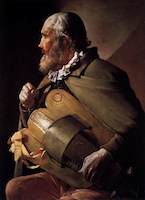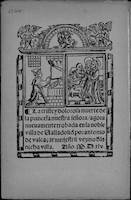The indenture of the blind master Martín de Zarajales and his blind pupil Juan de Aldeanueva in Guadalajara (1531)
López Suero,
Ana
Universidad de Valladolid
0000-0002-3065-1352
Abstract
The blind musician Martín de Zarajales agrees to teach the apprentice Juan de Aldeanueva, also blind, to play the vihuela de arco and as many prayers as possible. In the contract they state the contents and duration of the instruction, as well as the obligations of master and apprentice.
Keywords
music lessons , Apprenticeship contract , teaching , blind street singer , Martín de Zarajales (blind master) , Juan de Aldeanueva (blind apprentice) , indenture
In his treatise De Subventione Pauperum (Bruges, 1526), the humanist Juan Luis Vives offered a series of proposals to the senate of Bruges to create a proper policy about the relief of the poor in the city. To avoid mendicity, he noted, blind people should not be idle but dedicate themselves to tasks that they can accomplish, the performance of music among them. In fact, many blind people used to make their living by enlivening the everyday life of the streets with their prayers and songs in Vives’ time, and they seem to have been well organized long before his proposals, since the existence of blind brotherhoods in Europe is recorded since 1299. In Spain, multiple reports about their activity have come to us through the literature of the Golden Age. Furthermore, the large number of surviving chapbooks documents the popularity of the repertoire they performed.
See also: http://www.historicalsoundscapes.com/evento/891/granada/es.
Some blind people performed with the accompaniment of an instrument. Although details about how these musicians learned their craft are scarce, the document signed by the master Martín de Zarajales and the father of his apprentice Juan de Aldeanueva in Guadalajara provides some valuable information:
“In the city of Guadalajara, in my house, the present scribe at the parish of Saint Tomé, twenty-seven days of the month of May, in the year of the birth of Our Savior Jesus Christ, fifteen thirty-one, in the presence of me, Alonso de Carranza public notary, and the witnesses written bellow, Juan de Aldeanueva resident in the said place of Aldeanueva, hamlet of the said city, puts with Martín de Zarajales blind resident of the said town who was present, Juan de Aldeanueva blind his son, for a timespan of three years from today, the day of the formalization of this letter, onwards, until the said three years have passed. So in this time the said Martín de Zarajales will show the said Juan blind from Aldeanueva, son of the said Juan de Aldeanueva, to pray all the prayers that he can and have the ability to learn, and likewise to play the vihuela de arco as far as he can and have the ability to learn. And at the end of the said time, the said Martín de Zarajales will give a vihuela de arco with straps; and that in all this time the said Juan de Aldeanueva will give clothing to his son; and the shoes will be given by the said Martín de Zarajales”.
The agreement follows the standard pattern of indentures formalized between minstrels and their apprentices (or their parents or guardians), in which the skills to be learnt, the duration and cost of the apprenticeship, and the duties to be accomplished by master and pupil were noted in detail.
The masters guaranteed the teaching of the craft and, in most cases, the provision of: bed and board for the apprentice in the master’s home, the necessary instruments (in many cases at least one remained in the hands of the apprentice at the end of the apprenticeship), and a new suit.
The apprentices, for their part, committed: to learn the proper skills in the stipulated time, to obey the teacher in everything he ordered, and not to abandon their obligations during the learning period.
In many cases the apprentice was expected to participate in the performances of the master’s company during the learning period, for which he was given part of the earnings. At the end of the period, the pupil had to pass an exam in front of other masters to make sure that the contract had been fulfilled. However, not always did both parties accomplish their duties, so most indentures also included penalties: for the apprentice in case of abandonment of the contract, and for the master if the apprentice did not prove skilled enough at the end of the learning period.

